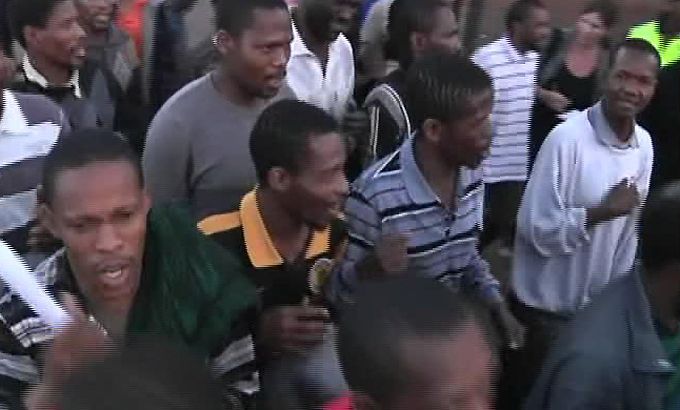Strikers march at S Africa’s platinum mine
At least 1,000 protest at mine where police shot and killed 34 miners, demanding a pay rise in renewed demonstration.

More than 1,000 striking South African miners have demonstrated at Lonmin’s Marikana mine, where
police shot dead 34 of their colleagues last month.
Dozens of police arrived at the scene on Wednesday while a helicopter hovered above the protesting rock-drill operators, whose strike to demand a hefty pay hike is now in its fourth week, crippling Lonmin.
Keep reading
list of 4 itemsA flash flood and a quiet sale highlight India’s Sikkim’s hydro problems
Why is Germany maintaining economic ties with China?
Behind India’s Manipur conflict: A tale of drugs, armed groups and politics
One man at the front of the column waved a placard reading “We want 12,500 or nothing else”, a reference to the group’s demand for a hike in base pay to $1,500 a month, more than double their current salary.
Another protester, who did not wish to be named, said the demonstrators were heading to Lonmin’s nearby Karee mine to “take out the people who are working in the mine shaft”.
| Marikana In depth |
 Can Zuma survive? Can Zuma survive? Mine Shooting: Who is to blame? Mine Shooting: Who is to blame? Unrest spreads Unrest spreads Mourning over mine deaths? Mourning over mine deaths? |
The government has apologised for the violence and a judicial inquiry investigating the violence is to report to President Jacob Zuma by January.
Jessie Durate, spokeswoman for African National Congress (ANC) said:“We are hoping through the process of the commission we will also come to the bottom of the story as to why mineworkers had come to the mine armed. Why two policeman were brutally murdered and why the police had shot with wild ammunition. Those are the issues we are dealing with at the moment.”
“It was tragic that people had to lose their lives over an industrial dispute and we hope that the commission of inquiry set up by the President will come to the bottom of this, will find a solution going forward and we hope that Lonmin in addition will also be able to assist in hearing the plea of the mineworkers for better pay. They are poor people and they need to be listened to,” she added.
Commentators say the strikes could hurt Zuma’s chances of re-election next year.
Al Jazeera’s Tania Paige, reporting from Marikana, said: “People are in a good mood, people have broken from two police barricades, they are demanding their bosses at Lonmin … speak to them.”
“The miners are trying to invigorate their campaign – after incidents of the past two weeks,” said our reporter.
Mines opened
However, at the Gold Fields KDC East mine in Johannesburg, the scene of violence on Tuesday, workers have agreed to go back to work.
Lesiba Seshoka, spokesperson for the National Union for Mineworkers (NUM), told Al Jazeera that the 12,000 miners striking at the mine had agreed to go back to work tonight.
“They have agreed to go back to work when their shift begins tonight,” he said.
“They have managed to highlight their concerns and this is important.”
|
Al Jazeera’s Mike Hanna gives an indepth |
On Tuesday the violence had spread to Johannesburg, with police and security guards firing rubber bullets and tear gas at sacked gold miners who have been blocking colleagues from working, officials and police said.
The workers have been striking and protesting against a new funeral benefit and the union branch leadership since Wednesday last week.
Police have arrested 13 people in connection with the violence at the Gold Fields mine in Springs, Johannesburg run by Gold One.
The clash at the mine was the latest violence to hit South Africa’s mines in months of unrest.
Froneman said as police were called to disperse the protesting miners, they stoned a vehicle carrying people to work.
“Our security had to intervene, they used rubber bullets and police used rubber bullets and tear gas,” Froneman told the Associated Press news agency. “Four people were slightly wounded and all have been released from the hospital.”
But Pinky Tsinyane, a police spokesman, said one of those wounded was in critical condition. The different versions could not immediately be reconciled. Tsinyane also said four people were arrested for public violence.
Tensions high
Talks between Lonmin management, unions and the government to ease tensions and get the striking miners back to work were due to resume at 1000 GMT in the nearby city of Rustenburg.
But the Marikana march suggested chances of a breakthrough were slim.
South Africa has been rocked by mining violence since August 16 when police shot and killed 34 striking miners at Lonmin platinum mine in Marikana. The miners were demanding a 300 per cent pay rise.
Days before the fatal shooting, 10 people, including two police officers, had been killed in violence at the mine located in the North West province.
After apartheid ended in 1994, South Africa pressed to share the country’s vast mineral wealth with its impoverished black majority. But the hoped-for result has not occurred.
World platinum prices have risen more than 10 per cent since the August 16 shooting, while Lonmin’s Johannesburg- and London-listed shares have lost more than 15 per cent of value.